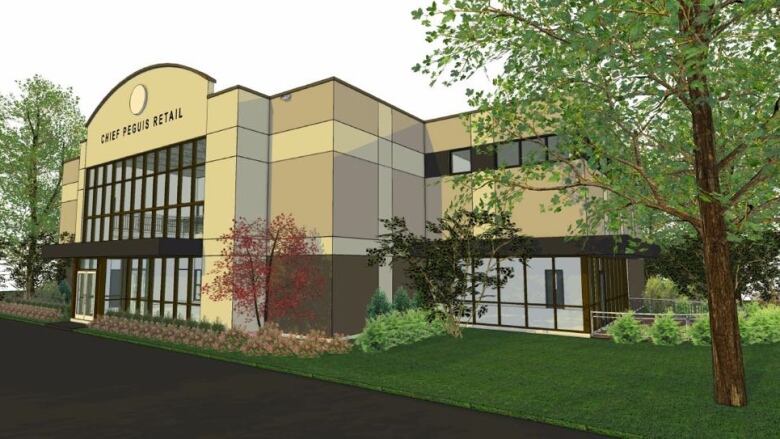Portage Avenue urban reserve to include cannabis shop, pain clinic
Winnipeg's 2nd urban reserve will include retail, office space and apartments

A retail cannabis shop, restaurant and pain management clinic are some of the planned retail tenants for a 14,000-square-foot urban reserve on Portage Avenue, Peguis First Nation officials announced at a groundbreaking ceremony on Wednesday.
The $6.5-million retail component of the development is expected to be completed by December with tenants moving in next year.
"It is long overdue," Peguis Chief Glenn Hudson said of the deal that has been five years in the making. "This city and this country is based on developments and I think with First Nations it is no different."
The development at 1075 Portage Ave., located adjacent from the RCMP's D Division headquarters, will be the second urban reserve in the city.
Long Plain First Nation opened Winnipeg's first urban reserve in the St. James area. It was designated an urban reserve in 2013, and a Petro-Canada gas station officially opened there in 2015.

- Demolition of abandoned Winnipeg military base paves way for urban reserve
- Winnipeg gets first urban reserve
Feast Café Bistro, which is currently on Ellice Avenue, has been approached to move in along with a clinic run by Mississauga-based The Clinic Network — a group of clinics geared toward treating pain with cannabis.
A six-storey office building is planned for the second phase of the development and the third phase will include the creation of two apartment complexes, with about 48 suites per building.
The entire project is about a $30-million investment, Hudson says.
Mayor Brian Bowman celebrated the new development, calling it a "historic day" for the city. He noted that the Indigenous people will soon encompass 25 per cent of the population of Winnipeg.
"We cannot afford on both a human level, as well as an economic development level, not to seize the opportunity that comes from a growing and beautiful Indigenous community," he said Wednesday.
A municipal development and services agreement (MDSA) with the reserve was approved by Winnipeg city council in July. The agreement means the city enters into a five-year agreement with the First Nation in exchange for a reduced service fee.
The First Nation, located about 150 kilometres northeast of Winnipeg, will pay 80 per cent of municipal taxes, with compensation available from the province for the difference for the first five years of the agreement.
Bowman says he is still waiting to hear whether the province will provide the other 20 per cent.
Corrections
- An earlier version of this story said the Feast Café Bistro was expected to open at the location. In fact, while the Bistro has been approached by Peguis First Nation it has not made a final decision.Aug 09, 2018 11:09 AM CT

